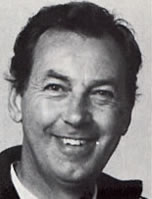Post by Macmoish on Jan 9, 2011 9:52:39 GMT
Bump/Edit 52 Years ago today: Gordon Jago appointed caretaker manager a couple of days after the Axing of Les ALLEN (in the aftermath of QPR's 3rd Round FA Cup Defeat at Home to Swindon)
qprreport.proboards.com/thread/9242/allen-axed-gordon-appointed-acting
January, 9, 1971 -
In his first game in charge - initially as Caretaker manager - after the axing of Les Allen, Gordon Jago's QPR drew 0-0 at Luton (with Venables returning in place of Martyn Busby and Ian Morgan replacing Mick McGovern)
Parkes
Clement Hazell Sibley Watson
Ferguson Francis Venables Morgan
Leach Marsh
Sub: McCulloch
January 6, 1971, QPR coach, Gordon Jago took over from Les Allen as QPR Manager, initially as caretaker manger after a series of poor results culminated in an FA Cup 3rd Round defeat! (at home to Swindon on a icy day which had QPR players slipping). Jago's performance soon led to the appointment being made "permanent." Jago had for the prior few months been coach under Allen. Had previously coached in the United State: At the time, this "foreign" connection which was then extremely rare, gave QPR a certain panache.
QPR's Manager for about 3 1/2 years. Jago led the team to safety that season; finish 5th the following season which saw Rodney Marsh sold. Led them to promotion the following season (which saw Bowles, Givens and Thomas signed). And the following season, saw them establish themselves in the First Division as Top London Club. Jago left the club after a not-so-great start the following season. (Being replaced by Dave Sexton). Basically the team that "won" the First Division Championship - with a couple of exceptions (Masson & Hollins) was the team that Jago built.
Not only did Jago do a great job. He also had the team playing great football. (with the help of his coach Bobby Campbell - subsequently "stolen" by Arsenal - and Terry Venables as player and a defacto coach.)
- Jago took over at Millwall and then Tampa Bay Rowdies (teaming up again with Rodney Marsh)
- A decade later, in the summer of 1984 Jim Gregory appointed Jago as General Manager to replace Terry Venables when he went to Barcelona. The idea was that there would be a team manager - maybe David Pleat under Jago. When Gregory couldn't get someone to serve under Jago, Jago was fired just over a week later.
Via Bushman in the first QPR programme post Allen's departure

50 Years Ago
Luton then managed by Alec Stock, with Don Givens and Mike Keen in the squad
VIA BUSHMAN
Gerry Francis & Mike Keen
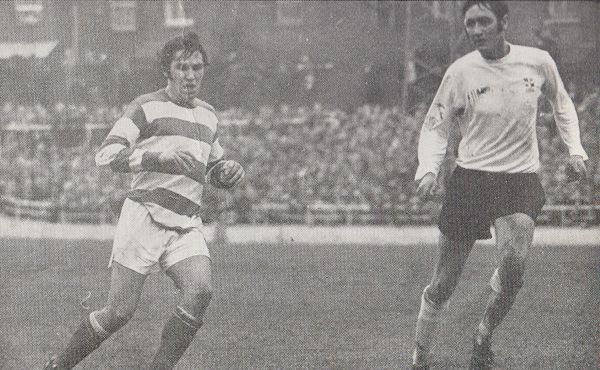
Ian Morgan & David Court
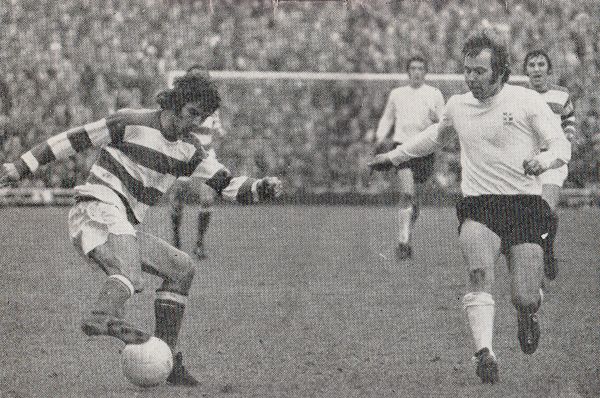
Mick Leach & Chris Nicholl
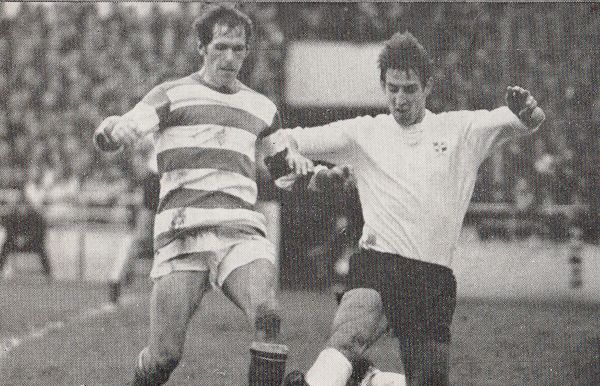
John Ryan & Mike Ferguson
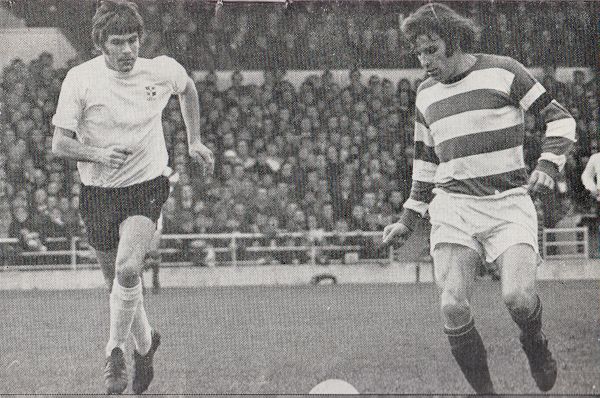
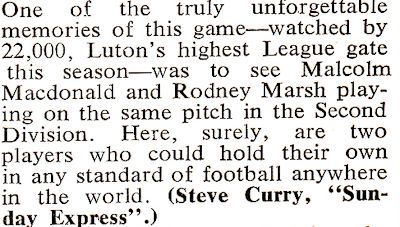
QPR OFFICIAL SITE - BLAST FROM THE PAST
In our latest instalment of exclusive interviews on www.qpr.co.uk, former R's boss Gordon Jago comes under the spotlight.
Gordon Jago - 1971-1974
Gordon Jago laid the early foundations for the greatest team in the history of Queens Park Rangers Football Club.
Jago was Manager at Loftus Road from 1971 to 1974. In that time, he built a side that eventually went on to compete with the best in the land.
He said: "It was the happiest period of my career. I took great pleasure from working with the QPR players and I always enjoyed the quality of their play.
"The key to our advancement was the sale of Rodney Marsh in March 1972. We didn't want him to leave, but it was Rodney's choice and he wished to join Manchester City. Fortunately, my Chairman Jim Gregory negotiated a marvellous transfer deal and we got £200,000 clear, which was a large sum of money to rebuild with in those days.
"There was a certain kind of player that was attractive to me. I always went for skilful technique. I didn't favour the old fashioned, big centre-forward down the middle and crashing the ball up to him. I liked to play good football.
"We faced Carlisle United just after Rodney left and Stan Bowles played magnificently against us at Loftus Road. I thought he would be ideal for me. A very similar type of striker to Marsh - very talented, able to beat people, a cute passer of the ball. Stan had a different type of personality, but it was still similar to Rodney's. They were both very flamboyant and I loved that.
"I had also watched Don Givens at Luton Town and Burnley's Dave Thomas. So the money we got for Rodney was used to buy Bowles, Givens and Thomas, who were three top class forwards. We didn't need a lot of new faces as we had some really promising youngsters coming through in Gerry Francis, Dave Clement and Ian Gillard.
"And when I got my final X1 together, from Clement at right-back all the way over to Thomas at outside-left, they could each play passing football. They were happy with the ball and had good touch. There were some great characters and we won promotion to the top flight in 1972/73."
Jago eventually left the R's in October 1974 after a disagreement behind the scenes. But he took immense pride as the Rangers success story continued with Dave Sexton in charge.
"You didn't have to be too clever to know that we had assembled a good squad," said Jago.
"In my first year up in the First Division, we finished eighth. We matched everybody and beat Arsenal and Chelsea for the first time in our history.
"We had a nice blend of experience - like McLintock and Venables - along with the younger element. So it was a perfect position for me as a manager. I felt that the next stage would be the upper echelons of the table and perhaps European football.
"Then unfortunately I fell out with Jim Gregory. It was the most disappointing day of my life when I resigned. It was a hellish decision for me to make.
"So when I walked away, I realised that I wasn't going to have the opportunity to fulfil my dream at Loftus Road. We'd started something, we'd built an excellent team and we'd gone a long way towards where we were aiming.
"I always knew that Rangers were going to be a top side. Of course the season after I departed, they finished runners-up in the League by a point to Liverpool and then went on a superb UEFA Cup run.
"Years afterwards as QPR sustained their status at the highest level, I was able to quietly say to myself 'I had a little bit to do with that.' It was nice to see Rangers become firmly established as a strong club."
Jago has since had a long coaching career in America. Despite being old enough to draw his pension, he still reports for work every day.
"I came out in 1978 so I've been here 30 years. I had six seasons as coach of Tampa Bay Rowdies before joining the Dallas Sidekicks, where I stayed in charge for 18 years. After that, I became Commissioner of the World Indoor Soccer League for three years.
"Nowadays, I am Executive Director of the Dallas Cup, which is the most prestigious youth soccer tournament in the world. I bring in 184 teams from all over the globe. We've had Manchester United, Real Madrid and Chelsea here in recent times.
"I'm 75 years old now and my current role has enabled me to renew a great deal of my old football friendships. Often when I put the phone down after speaking to people over in England, I'm almost certain they say 'I didn't know he was still alive!'
"I'm still having great fun in soccer. I've been very lucky and I've had great health. My wife June has recovered from Cancer so we are very blessed.
"And my blood has always been blue and white for QPR. It has been disappointing to see that the club has not enjoyed good fortune in recent years. But let's hope that the new owners can turn it around and put the Hoops where they should be back up in the Premier League." QPR
qprreport.proboards.com/thread/9242/allen-axed-gordon-appointed-acting
January, 9, 1971 -
In his first game in charge - initially as Caretaker manager - after the axing of Les Allen, Gordon Jago's QPR drew 0-0 at Luton (with Venables returning in place of Martyn Busby and Ian Morgan replacing Mick McGovern)
Parkes
Clement Hazell Sibley Watson
Ferguson Francis Venables Morgan
Leach Marsh
Sub: McCulloch
January 6, 1971, QPR coach, Gordon Jago took over from Les Allen as QPR Manager, initially as caretaker manger after a series of poor results culminated in an FA Cup 3rd Round defeat! (at home to Swindon on a icy day which had QPR players slipping). Jago's performance soon led to the appointment being made "permanent." Jago had for the prior few months been coach under Allen. Had previously coached in the United State: At the time, this "foreign" connection which was then extremely rare, gave QPR a certain panache.
QPR's Manager for about 3 1/2 years. Jago led the team to safety that season; finish 5th the following season which saw Rodney Marsh sold. Led them to promotion the following season (which saw Bowles, Givens and Thomas signed). And the following season, saw them establish themselves in the First Division as Top London Club. Jago left the club after a not-so-great start the following season. (Being replaced by Dave Sexton). Basically the team that "won" the First Division Championship - with a couple of exceptions (Masson & Hollins) was the team that Jago built.
Not only did Jago do a great job. He also had the team playing great football. (with the help of his coach Bobby Campbell - subsequently "stolen" by Arsenal - and Terry Venables as player and a defacto coach.)
- Jago took over at Millwall and then Tampa Bay Rowdies (teaming up again with Rodney Marsh)
- A decade later, in the summer of 1984 Jim Gregory appointed Jago as General Manager to replace Terry Venables when he went to Barcelona. The idea was that there would be a team manager - maybe David Pleat under Jago. When Gregory couldn't get someone to serve under Jago, Jago was fired just over a week later.
Via Bushman in the first QPR programme post Allen's departure
50 Years Ago
Luton then managed by Alec Stock, with Don Givens and Mike Keen in the squad
VIA BUSHMAN
Gerry Francis & Mike Keen

Ian Morgan & David Court

Mick Leach & Chris Nicholl

John Ryan & Mike Ferguson


QPR OFFICIAL SITE - BLAST FROM THE PAST
In our latest instalment of exclusive interviews on www.qpr.co.uk, former R's boss Gordon Jago comes under the spotlight.
Gordon Jago - 1971-1974
Gordon Jago laid the early foundations for the greatest team in the history of Queens Park Rangers Football Club.
Jago was Manager at Loftus Road from 1971 to 1974. In that time, he built a side that eventually went on to compete with the best in the land.
He said: "It was the happiest period of my career. I took great pleasure from working with the QPR players and I always enjoyed the quality of their play.
"The key to our advancement was the sale of Rodney Marsh in March 1972. We didn't want him to leave, but it was Rodney's choice and he wished to join Manchester City. Fortunately, my Chairman Jim Gregory negotiated a marvellous transfer deal and we got £200,000 clear, which was a large sum of money to rebuild with in those days.
"There was a certain kind of player that was attractive to me. I always went for skilful technique. I didn't favour the old fashioned, big centre-forward down the middle and crashing the ball up to him. I liked to play good football.
"We faced Carlisle United just after Rodney left and Stan Bowles played magnificently against us at Loftus Road. I thought he would be ideal for me. A very similar type of striker to Marsh - very talented, able to beat people, a cute passer of the ball. Stan had a different type of personality, but it was still similar to Rodney's. They were both very flamboyant and I loved that.
"I had also watched Don Givens at Luton Town and Burnley's Dave Thomas. So the money we got for Rodney was used to buy Bowles, Givens and Thomas, who were three top class forwards. We didn't need a lot of new faces as we had some really promising youngsters coming through in Gerry Francis, Dave Clement and Ian Gillard.
"And when I got my final X1 together, from Clement at right-back all the way over to Thomas at outside-left, they could each play passing football. They were happy with the ball and had good touch. There were some great characters and we won promotion to the top flight in 1972/73."
Jago eventually left the R's in October 1974 after a disagreement behind the scenes. But he took immense pride as the Rangers success story continued with Dave Sexton in charge.
"You didn't have to be too clever to know that we had assembled a good squad," said Jago.
"In my first year up in the First Division, we finished eighth. We matched everybody and beat Arsenal and Chelsea for the first time in our history.
"We had a nice blend of experience - like McLintock and Venables - along with the younger element. So it was a perfect position for me as a manager. I felt that the next stage would be the upper echelons of the table and perhaps European football.
"Then unfortunately I fell out with Jim Gregory. It was the most disappointing day of my life when I resigned. It was a hellish decision for me to make.
"So when I walked away, I realised that I wasn't going to have the opportunity to fulfil my dream at Loftus Road. We'd started something, we'd built an excellent team and we'd gone a long way towards where we were aiming.
"I always knew that Rangers were going to be a top side. Of course the season after I departed, they finished runners-up in the League by a point to Liverpool and then went on a superb UEFA Cup run.
"Years afterwards as QPR sustained their status at the highest level, I was able to quietly say to myself 'I had a little bit to do with that.' It was nice to see Rangers become firmly established as a strong club."
Jago has since had a long coaching career in America. Despite being old enough to draw his pension, he still reports for work every day.
"I came out in 1978 so I've been here 30 years. I had six seasons as coach of Tampa Bay Rowdies before joining the Dallas Sidekicks, where I stayed in charge for 18 years. After that, I became Commissioner of the World Indoor Soccer League for three years.
"Nowadays, I am Executive Director of the Dallas Cup, which is the most prestigious youth soccer tournament in the world. I bring in 184 teams from all over the globe. We've had Manchester United, Real Madrid and Chelsea here in recent times.
"I'm 75 years old now and my current role has enabled me to renew a great deal of my old football friendships. Often when I put the phone down after speaking to people over in England, I'm almost certain they say 'I didn't know he was still alive!'
"I'm still having great fun in soccer. I've been very lucky and I've had great health. My wife June has recovered from Cancer so we are very blessed.
"And my blood has always been blue and white for QPR. It has been disappointing to see that the club has not enjoyed good fortune in recent years. But let's hope that the new owners can turn it around and put the Hoops where they should be back up in the Premier League." QPR





